Foods to Avoid if You Have Cholesterol - What Not to Include in Your Diet
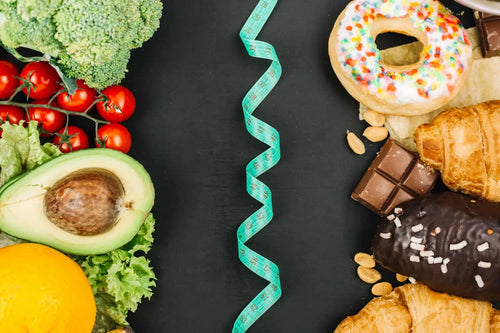
Cholesterol is important for your body. It helps make hormones, cells, and vitamins that keep you healthy. But a lot of people, like 94 million adults in America, have too much cholesterol. This raises their chances of heart disease and stroke.
Even if you already take medicine to lower your cholesterol, you can also make some easy changes to what you eat. This can lower your risk of heart problems and even more diseases. This article talks about foods you can eat to improve your cholesterol. It also tells you which foods to avoid.
What is Cholesterol?
Cholesterol is a type of fat that moves around in the blood using two types of proteins: low-density lipoprotein (LDL) and high-density lipoprotein (HDL).
LDL cholesterol is often called "bad" because it can lead to fatty buildup in blood vessels. This buildup might block blood flow and cause heart attacks or strokes.
On the other hand, HDL cholesterol, known as "good," helps remove cholesterol from the body by taking it to the liver. Having high levels of HDL cholesterol can lower the chances of heart issues and strokes.
10 Worst Foods to Avoid for High Cholesterol
-
Red Meat
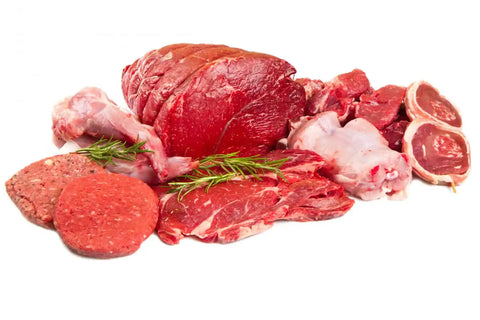
Common types of red meat like beef, pork, and lamb are typically high in saturated fat. Fatty cuts such as hamburgers, ribs, pork chops, and roasts contain the highest levels of fat. While you don't need to eliminate red meat entirely, it's advisable to consume it only occasionally. Opt for leaner cuts like sirloin, pork loin, or filet mignon, and adhere to the recommended 3-ounce portion size.
For healthier choices, consider substituting red meat with proteins that are lower in saturated fat and cholesterol, such as skinless chicken or turkey breast, fish, and beans.
-
Processed Meats

Hot dogs, sausage, and bacon typically utilize the fattiest cuts of red meat, resulting in high cholesterol and saturated fat content. Even versions made with turkey or chicken, like bacon and sausage, may appear to be healthier options but still contain cholesterol.
-
Fried Foods

Foods that take a swim in hot oil, like chicken wings or onion rings, aren't the healthiest because they can raise your cholesterol. When food gets fried, it also packs in more calories.
If you enjoy the crispy texture of fried food, try using an air fryer and a little olive oil instead. You can also bake foods like potato wedges and chicken at a high temperature until they're nice and golden.
-
Baked Goods
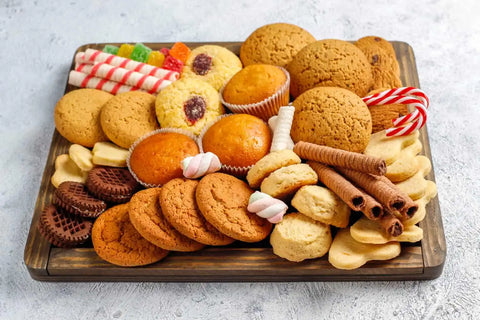
Cookies, cakes, and pastries often have lots of butter and shortening, which can also raise cholesterol. You don't have to skip dessert completely—just make a few changes. Instead of using butter, try using applesauce or bananas when you bake. Or you can have low-fat frozen yogurt with berries for a tasty treat.
-
Frozen Foods
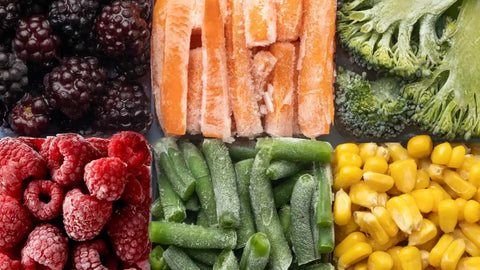
Busy people often buy frozen meals from the store because they're convenient. But many of these meals have trans fats to help them last longer. This ultimately leads to higher cholesterol levels.
-
Whole-Fat Dairy
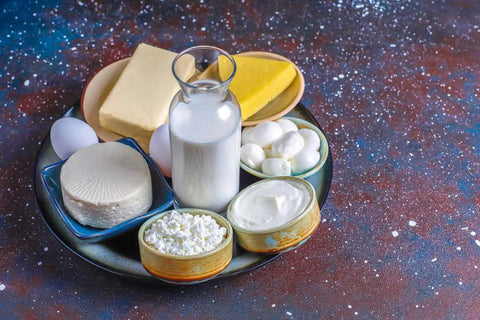
Eating full-fat dairy products can raise your LDL cholesterol levels, which isn't good for your health. They have lots of saturated fat and cholesterol.
-
Margarine
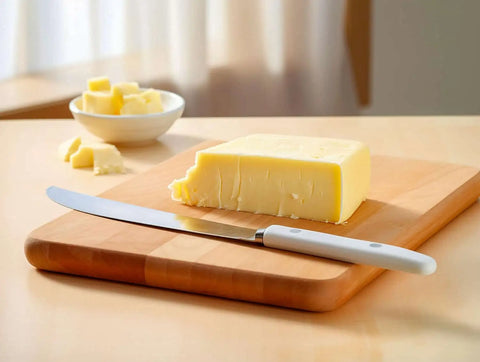
Some margarine has trans-fat, which is bad for your cholesterol levels and heart health. Margarine with hydrogenated or partially hydrogenated oils has trans fats and should be skipped.
-
Coffee Creamers

For those who love their coffee, using non-dairy creamers can be a regular part of your morning routine. But be mindful – they might bring in trans-fat over time. While one serving usually has 0 grams of trans-fat, some flavors contain partially hydrogenated oils as the second or third ingredient. This can add up, especially if you have multiple servings each day. So, pay attention to how much you're using.
-
Coconut Oil

Coconut oil is mostly saturated fat, about 86 percent, which is even more than butter (at 52 percent). Diets with lots of saturated fat can raise bad cholesterol levels, which isn't good for your heart health. Some people think certain saturated fats in coconut oil might be better, but we need more research to be sure. For now, it's better to be cautious about using too much coconut oil.
-
Palm Oil
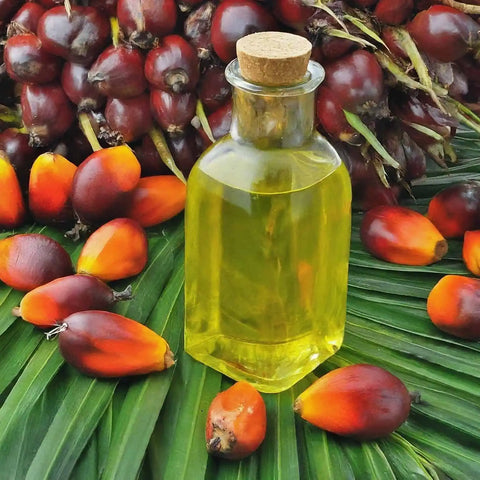
Palm oil might not be the healthiest choice because it has a lot of saturated fat, which could affect cholesterol levels. Compared to other oils, palm oil contains around 50% saturated fat. As mentioned earlier, eating too much-saturated fat can raise LDL cholesterol levels and affect heart health.
What Are the Best Foods to Lower High Cholesterol?
-
Eggplant

Eggplant is a veggie that's good for you. It has a lot of dietary fiber – about 2.4 grams in just one cup. This fiber is great for your heart. It helps make your blood cholesterol levels better, lowering the risk of heart disease, stroke, obesity, and type 2 diabetes.
-
Okra
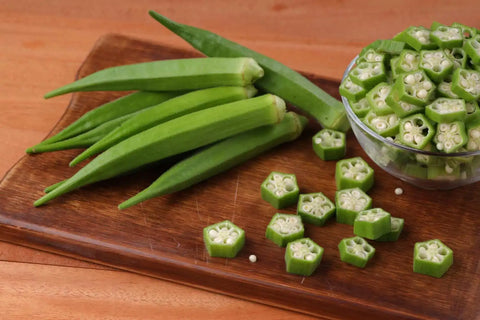
Okra, also known as lady’s fingers, is a vegetable that grows in warm weather all over the world. In okra, there's a gel called mucilage. This gel can team up with cholesterol during digestion, helping it leave your body when you go to the bathroom. It's like a natural way to keep your cholesterol in check.
-
Apples
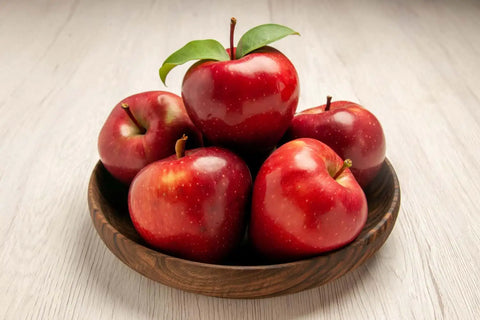
Apples are not just tasty; they're good for your cholesterol too. A small study found that eating two apples a day helped people with slightly high cholesterol. It didn't just reduce total and LDL cholesterol, but also brought down levels of another fat called triglycerides. Apples have fiber – about 3–7 grams depending on their size. They also have something called polyphenols, which may also be good for your cholesterol. So, an apple a day might really keep the doctor away!
-
Avocado
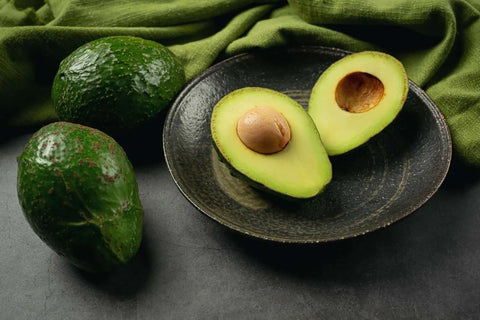
Avocados are super healthy for your heart. Eating one a day, as part of a diet that's not too high in fat, can make your heart healthier. A study in 2015 found that avocados can lower bad cholesterol (LDL) without touching the good cholesterol (HDL).
A cup of avocado has about 14.7 grams of monounsaturated fats, which can keep your LDL cholesterol low and reduce the chance of heart problems like strokes and heart disease.
-
Fish
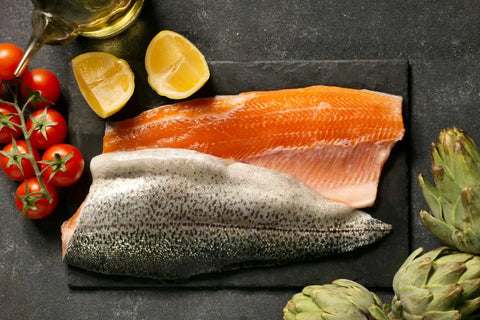
Fish like salmon, mackerel, and sardines are packed with omega-3 fats, especially EPA. These fats are awesome for your heart and can fight inflammation.
EPA doesn't just lower triglycerides; it also protects your heart and blood vessels from getting sick. It stops cholesterol crystals from building up in your arteries, calms down inflammation, and makes your good cholesterol (HDL) work better. All of these things help keep your heart ticking smoothly.
-
Oats
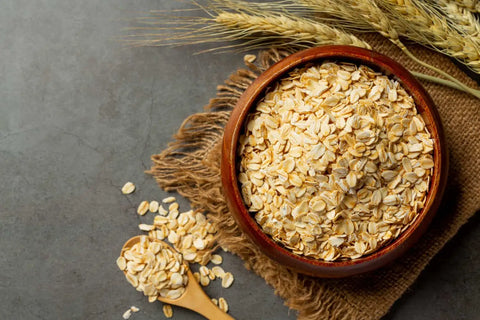
Eating oats can make your heart healthier. In a small study from 2017, researchers discovered that after just 4 weeks, the cholesterol levels of participants went down by 11.6%. Another study in 2019 confirmed that the fiber in oats helps lower bad cholesterol (LDL) and can reduce the risk of heart problems as part of a heart-friendly diet. You can easily include oats in your meals by having oatmeal or oat-based cereal for breakfast.
-
Barley
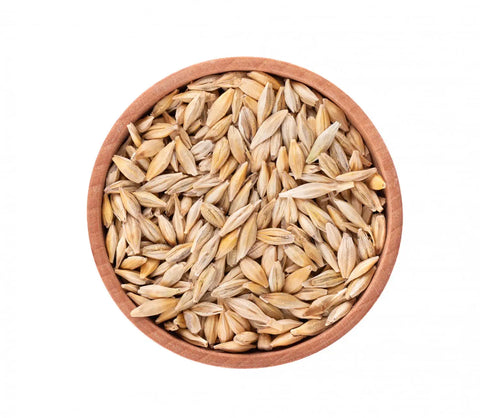
Barley is a healthy grain packed with good stuff like vitamins and minerals, plus it's high in fiber. According to a study in 2020, a type of soluble fiber called beta-glucan in barley lowers LDL cholesterol by trapping bile acids, making the body absorb less cholesterol during digestion. This process helps decrease overall cholesterol levels. Beta-glucan in barley also does good things for your gut and helps control blood sugar, which is even better for your heart.
-
Nuts

Nuts are a great source of healthy fats that can lower LDL cholesterol levels, especially when you swap them for less healthy fats in your diet. They also bring in extra fiber, which helps prevent your body from absorbing too much cholesterol and helps get rid of it.
All kinds of nuts are good for your heart and can help lower cholesterol, including:
- Almonds
- Walnuts
- Pistachios
- Pecans
- Hazelnuts
- Brazil nuts
- Cashews
-
Lentils
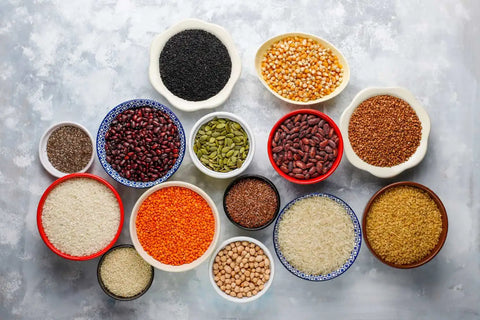
Lentils are full of fiber, with 7.8 grams in just half a cup. This fiber is great because it stops cholesterol from getting into your blood. In a small study in 2015 with 39 people who had type 2 diabetes and were overweight, eating lentil sprouts was found to lower cholesterol levels.
-
Soy
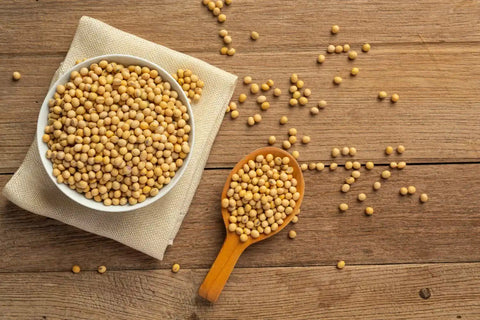
Soybeans and soy products like tofu, soy milk, and soy yogurt can be good for lowering cholesterol.
In a study from 2019 that looked at 46 different research papers, they found that eating about 25 grams of soy protein each day for 6 weeks can lower LDL cholesterol by about 4.76 milligrams per deciliter. This drop is considered clinically significant.
Overall, the researchers discovered that soy protein can lower LDL cholesterol levels in adults by approximately 3–4% on average. This shows that soy is a great addition to a diet that's good for the heart and helps lower cholesterol.
Begin your journey towards a healthier you with Rotimatic!
Frequently Asked Questions
-
Are all fats bad for cholesterol?
No, avoid saturated and trans fats; go for healthy fats like monounsaturated and polyunsaturated fats.
-
Does high cholesterol cause heart attacks or strokes?
Yes, high cholesterol increases the risk of heart attacks and strokes. Managing cholesterol through lifestyle changes and sometimes medication is crucial for heart health. Regular check-ups with healthcare professionals are recommended.
-
Should I cut out all foods with cholesterol?
No, but limit foods high in cholesterol like organ meats, shellfish, and egg yolks.
-
Can I eat carbohydrates if I have high cholesterol?
Yes, choose complex carbohydrates like whole grains, fruits, and vegetables over refined ones.
-
Are there specific cooking oils to avoid for managing cholesterol?
Yes, avoid oils high in saturated and trans fats. Opt for heart-healthy choices like olive oil or canola oil.